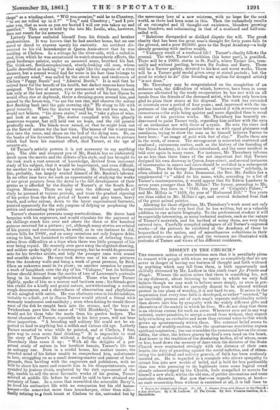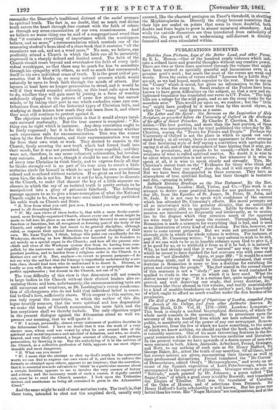DISSENT IN THE CHURCH.*
THE common notion of conscientious men that it is peculiarly pious to consort with people with whom we agree so completely that we are never in danger of having our horizon of thought and faith widened by anything which may fall from them, is both opportunely and skilfully discussed by Mr. Ludlow in this ninth tract for Priests and People. Whence the notion arises that there is something lax, not to say dishonest, about listening to truths in which we only half believe though we may wish to believe more deeply, or even in per- mitting any from which we earnestly dissent to be uttered without protest in our place of worship, it is not hard to see. It arises in the impression that every true faith is developed, or rather " secreted," by an inevitable process out of each man's separate individuality rather than drawn into him by sympathy with the widely different gifts and characters of the society in which he lives. We do not deny that there is an obvious excuse for such an error. Wherever men are in any way ordered, under penalties, to accept a creed from without, they cannot help attaching an exclusive and more than rational value to that which grows up spontaneously within them. The external belief seems to them one of worldly custom, while the spontaneous conviction argues spiritual inspiration; the one resembles the ceremonial law on the stone tables, the other, the letters graven by God's own hand on the heart. And hence in the tradition of the dissenting bodies, all of whom, more or less, hand down the memory of days when the dictates of the State Church were contrasted strongly with the dictates of their own hearts, the duty of guarding against the social infection, and of stimu- lating the individual and solitary genesis, of faith has been zealously insisted on. He is regarded as a renegade who allows sympathy to attract him into new worlds of belief, and is held far less pardonable than one who pursuing to its legitimate issue some logical creed already acknowledged by his Churcle feels compelled to secrete for himself a new shell, within the old one, of pettier dimensions and more exclusive character. But now that—as regards laymen, at least— no such censorship from without is exercised" xercise at all, it is full time to * Tracts for Prints and P ie. No. IX. L Dissent from and Dissent in the Church : a Lay Dialogue. By J. M. L ow. II. The One*. By Bear. Francis Garden, M.A. Macmillan. reconsider the Dissenter's traditional distrust of the social avenues to spiritual truth. The fact is, no doubt, that as much real divine
truth enters the heart through free contact with the faith of others as through any cross-examination of our own consciousness. And we believe no worse thing can be said of a congregational creed than that "it contains everything of importance which the worshippers believe, and no more," a recommendation which reminds one of the cramming student's beau ideal of a class-book that it contains "all the examiners can ask, and not a word more." No man, we believe, can profitably attend a Church in which the faith can all be accurately expressed in a sharply defined and limited creed. The faith of the Church should reach beyond and overshadow the faith of every indi- vidual worshipper, so that there may be much for him to assimilate through his sympathy with others, as well as much that recommends itself to his own individual sense of truth. It is the great evil of per- secution that it blocks up so many natural avenues which would naturally be open to fresh faith through the minds of others. But laymen at least have no longer persecution to dread, and it would be
well if they would consider seriously, as this tract calls upon them to do, whether they will gain most by joining in a form of worship sedulously clipped to the pattern of some few strong but narrow minds, or. by taking their part in one which embodies some rare con- tributions from almost all the historical types of Christian faith, and studying at their leisure how much they can learn from it, and where they must still continue to protest against it. The objection raised to this position is that it would always incul- cate outward conformity. But the true answer is complete : "No- thing thing can be right which is insincere. Any deep conviction ought to be freely expressed ; but it is for the Church to determine whether such expression calls for excommunication. This was the course taken by the first Protestants, and their excommunication was very far from their own wish or work. They desired to remain in the Church, freely avowing the new truth which had forced itself into their minds, but it was not permitted. They were expelled; and they were not, therefore, in any sense voluntary schismatics, but involun- tary outcasts. And so now, though it should be one of the first aims of every true Christian to think freely, and to express freely all that he thinks strongly—it is no part of his true aims to create a little sectarian circle for himself in which lie may hear his own convictions echoed and re-echoed without variation. If so great an evil be forced upon him, the sin is not his. But it is not for him, because he dissents in the Church, to make that dissent the key of a little separate en- closure in which the ray of an isolated truth is pretty certain to be manipulated into a glory of prismatic falsehood. The following passage appears to us to give a truer conception of what the National Church ought to be, than any we have seen since Coleridge published his noble work on Church and State.
" B. Now from what you said just now, I fancied you were bitterly op- posed to all dissenting bodies.
" W. My own views of these bodies is, that with a more freely-consti- tuted, more livingly-organized Church, almost every one of them might be made to fall into its place as an order or fraternity devoted to some special function or functions, but all recognized as forming part of the body of the Church, and subject in the last resort to its general discipline, although ruled, as respects their special functions, by a special discipline of their own. Mr. Isaac Taylor, I think, brings this point out excellently for the Wesleyans, showing us how Methodism was intended by its founders to act merely as a special organ in the Church; and how all the present mis- chiefs and vices of the Wesleyan system flow from its having been com- pelled, by the narrowness and stupidity of Churchmen, to assume an inde- pendent position, and to harden from a religious order in the Church to a distinct sect out of it. But, anyhow—to revert to present purposes—I do not see why the sad fact that the Liturgy is imperfectly understood by a cer- tain class, should lead men who do understand it to desert it. Dissent, as loudly as you will, from whatever tends to cause or to perpetuate that im- perfect apprehension ; but dissent in the Church, not out of it."
The true difficulty of this view is that dissenters will not remain in large bodies in the Church without their clerical leaders also re- maining there; and here, unfortunately,the excommunicating tests are still numerous and vexatious, as Dr. Lushington's recent condemna- tion of all clergymen who do not hold that individual belief is essen- tial to God's love, sufficiently shows. With respect to this matter, we can only repeat the conviction, in which the author of this dia- logue heartily concurs, that the more spiritual and less dogmatical we make the basis of Church communion, the more faith and the less scepticism shall we thereby include. The only objection urged in the present dialogue against the Athanasian creed so well ex- presses our meaning, that we will quote it : " W. I accept, personally, almost every statement of positive doctrine in the Athanasian Creed. I have no doubt that it was the work of a very sincere man, whose soul was vexed by what he saw around him of the spiritual and moral impotence and mischief of Arianism, and who, no doubt, braved, and very likely endured, a large amount of obloquy, and perhaps persecution, by drawing it up. But the embodying of it in the services of the Church, as a collective profession of faith, appears to me most objec- tionable and most dangerous.
What can you mean ?
" W. I mean that the attempt to shut up God's truth in the narrowest words we can find to express our own views of it, and then to enforce the formula so obtained upon others, appears to me impious; that the assertion, that it is essential towards salvation to think' in a particular manner about a certain doctrine, appears to me to involve the very essence of heresy and schism; and the necessary result of such a course, if rigidly carried out, must be to rend the Church asunder. I look upon the Tridentine decrees and anathemas as being all contained in germ in the Athanasian Creed."
And the same might be said of most sectarian tests. The truth is, that these tests, intended to shut out the sceptical devil, usually only succeed, like the charmed pentagon on Faust's threshold, in shutting the Mephistopheles in. Directly the clergy become conscious that their lips are sealed on points that seem to them doubtful, both doubts and fears begin to grow in almost unnatural abundance. And while the outside dissenters are thus interdicted from catholicity of worship, the growth of an undermining self-distrust is directly fomented and even stimulated within.































 Previous page
Previous page